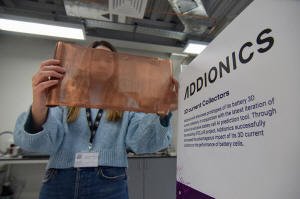|
GM co-leads $39 million funding for EV
battery materials startup Addionics
 Send a link to a friend
Send a link to a friend
[July 25, 2024]
By Nick Carey
LONDON (Reuters) - Israeli battery technology company Addionics has
raised $39 million from investors including General Motors' venture
capital arm to help commercialize its copper and aluminum electrodes for
electric vehicle batteries, it said on Thursday.
|

Bernadett Vejkey, marketing manager at Addionics, holds up a sheet of a
porous, three-dimensional copper anode the battery materials startup has
developed for electric vehicle batteries, at the company's lab in
London, Britain, December 5, 2023. REUTERS/Nick Carey/File Photo |
|
GM
Ventures co-leads the B Series funding round with Israeli tech
venture fund Deep Insight. Swedish truck maker Scania, owned by
Volkswagen's Traton also participated in the investment round.
As well as investing in Addionics, GM and Scania are potential
customers for the company's porous, three-dimensional copper and
aluminum electrode battery materials that use less material -
including 60% less copper.
Addionics says the electrodes, which look like sheer silk
scarves when held up to the light, provide faster charging and
boost EV range by 30%. It forecasts savings for automakers up to
$7.50 per kilowatt hour.
"Addionics' current collector design shows promise in enabling
improved battery performance at a lower cost," GM Ventures
managing director Anirvan Coomer said in a statement. "We are
eager to support the company's growth and look forward to
continuing to explore opportunities to collaborate in the
future."
Earlier this year, Addionics said it plans a $400 million U.S.
factory to make copper anodes for EV batteries starting in 2027
to eventually supply enough for about 1 million EVs a year.
Addionics CEO Moshiel Biton said that in late 2024 the company
will start delivering battery cells to automakers to test and
that it is on track to deliver product at scale by 2027 or 2028.
He said the company has been working with or talking to
virtually all the major automakers in Europe, Japan and the
United States.
"Legacy automakers are losing money building EVs," Biton said.
"Any technology that allows them to reduce cost and improve
performance, that's the holy grail."
(Reporting By Nick Carey; editing by Barbara Lewis)
[© 2024 Thomson Reuters. All rights
reserved.]
This material may not be published,
broadcast, rewritten or redistributed.
Thompson Reuters is solely responsible for this content.

|
|
|




